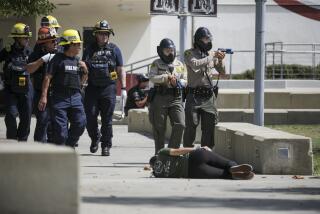Governor Signs Bill to Reform Jury Duty
- Share via
SACRAMENTO — Californians who are called for jury duty will finish their obligation in one day or one trial, beginning next year.
Gov. Pete Wilson signed a bill Tuesday that requires jury duty to last only one day, unless the person is seated on a jury.
The bill was one of several signed by the governor, including measures to develop a vaccine for valley fever, add 60,000 felons to the state’s DNA database and lower fees for resident graduate students.
“Jury service is our civic duty,” Wilson said. “But our current system has become too burdensome for most hard-working men and women of California.”
The bill by Sen. Bill Lockyer (D-Hayward) allows people who have served on one trial, no matter how long it is, to have finished their jury duty. They would also be done if they were called for a jury panel, but dismissed during jury selection.
A Judicial Council task force in 1996 found that only 10% of the nearly 4 million Los Angeles residents who were mailed jury questionnaires in 1994-95 actually appeared for jury service. Only about 30% of prospective jurors who show up for jury duty actually serve on a trial.
The American Bar Assn. says juror participation has risen significantly in the states that use the one-day or one-trial system.
The bill dealing with valley fever requires state health officials to create a valley fever project to develop a vaccine for the deadly fungal disease.
The project--under the auspices of the state Department of Health Services--will be funded with $3 million in this year’s state budget. The bill was by Assemblyman Roy Ashburn (R-Bakersfield).
Between 1991 and 1993, there were more than 10,000 cases of valley fever reported in the Central Valley, resulting in 280 deaths.
The disease is caused by a tiny airborne fungus that is inhaled. Symptoms can be like the flu or meningitis.
Under another bill signed Tuesday, California will add DNA samples from 60,000 felons to its database. That will make it easier for law enforcement to use DNA technology to match suspects with crimes.
More to Read
Sign up for Essential California
The most important California stories and recommendations in your inbox every morning.
You may occasionally receive promotional content from the Los Angeles Times.













